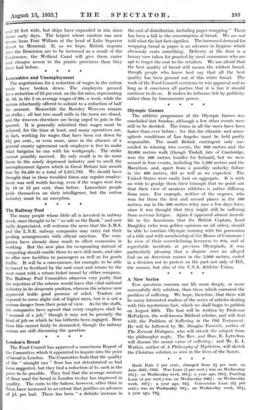Lancashire and Unemployment The negotiations for a reduction of wages
in the cotton trade have broken down. The employers pressed for a reduction of 25 per cent. on the list rates, representing 2s. 9d. in the £ on average wages of 38s. a week, while the unions reluctantly offered to submit to a reduction of half the amount. Meanwhile the Burnley Weavers remain on strike ; all but two small mills in the town are closed, and the weavers elsewhere are being urged to join in the quarrel. It is generally admitted that wages must be reduced, for the time at least, and many operatives are, in fact, working for wages that have been cut down by 121 per cent., or even more, since in the absence of a general county agreement each employer is free to make what bargains he can with his workpeople. The strike cannot possibly succeed. Its only result is to do more harm to the sorely depressed industry and to swell the unemployment figures which in Great Britain last month rose by 64,439 to a total of 2,811,782. We should have thought that in these troubled times any regular employ- ment was well worth having, even if the wages were less by 10 or 12 per cent. than before. Lancashire people pride themselves on their intelligence, but the cotton industry must be an exception.






























 Previous page
Previous page